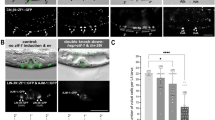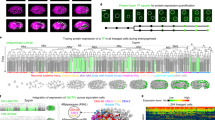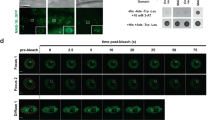Abstract
During wild-type development, a protein product of the Caenorhabditis elegans heterochronic gene lin-14 is localized to nuclei of specific somatic cells in embryos and early larvae, but is absent in late larvae and adult soma. Gain-of-function lin-14 mutations cause the level of lin-14 protein to remain high throughout development, resulting in developmental reiterations of early cell lineages. The normal down-regulation of the lin-14 nuclear protein level encodes a temporal switch between early and late cell fates.
This is a preview of subscription content, access via your institution
Access options
Subscribe to this journal
Receive 51 print issues and online access
$199.00 per year
only $3.90 per issue
Buy this article
- Purchase on Springer Link
- Instant access to full article PDF
Prices may be subject to local taxes which are calculated during checkout
Similar content being viewed by others
References
Ingham, P. W. Nature 335, 25–34 (1988).
Kenyon, C. Cell 46, 477–487 (1986).
Sternberg, P. S. & Horvitz, H. R. A. Rev. Genet. 18, 489–524 (1984).
Blochlinger, K. et al. Nature 333, 629–635 (1988).
Chalfie, M., Horvitz, H. R. & Sulston, J. E. Cell 24, 59–69 (1981).
Ambros, V. & Horvitz, H. R. Science 266, 409–416 (1984).
Ambros, V. & Horvitz, H. R. Genes & Dev. 1, 398–414 (1987).
Ruvkun, G. et al., Genetics (in the press).
Ruther, U. & Muller-Hill, B. EMBO J. 2, 1791–1794 (1983).
Sulston, J. E., Schierenberg, E., White, J. G., & Thomson, J. N. Devl Biol. 100, 64–119 (1983).
Sulston, J. E. & Horvitz, H. R. Devl Biol. 56, 110–156 (1977).
Scott, M. P., Weiner, A. J. Proc. natn. Acad. Sci. U.S.A. 81, 4115–4119 (1984).
Rosenberg, U. B. et al. Nature 319, 336–339 (1986).
McKeown, M., Belote, J. M. & Baker, B. S. Cell 48, 489–499 (1987).
Spieth, J., Denison, K., Kirtland, S., Cane, J. & Blumenthal, T. Nucleic Acids Res. 13, 5283–5295 (1985).
Raff, R. A. & Kaufman, T. C. in Embryos, Genes, and Evolution, 395 (Macmillan, London, 1983).
Maniatis, T., Fritsch, E. F. & Sambrook, J. in Molecular Cloning, 545 (Cold Spring Harb., 1982).
MacDonald, P. M. & Struhl, G. Nature 324, 537–545 (1986).
Ausubel, F. M. et al. in Current Protocols in Molecular Biology (Wiley Interscience, 1987).
Karr, T. L. & Alberts, B. M. J. Cell Biol. 102, 1489–1502 (1986).
Desai, C., et al. Nature 336, 638–646 (1988).
Author information
Authors and Affiliations
Rights and permissions
About this article
Cite this article
Ruvkun, G., Giusto, J. The Caenorhabditis elegans heterochronic gene lin-14 encodes a nuclear protein that forms a temporal developmental switch. Nature 338, 313–319 (1989). https://doi.org/10.1038/338313a0
Received:
Accepted:
Issue Date:
DOI: https://doi.org/10.1038/338313a0
This article is cited by
-
Micro (mi) RNA and Diabetic Retinopathy
Indian Journal of Clinical Biochemistry (2022)
-
Temporal transitions in the post-mitotic nervous system of Caenorhabditis elegans
Nature (2021)
-
Role of PRY-1/Axin in heterochronic miRNA-mediated seam cell development
BMC Developmental Biology (2019)
-
Comparative proteome analysis between C . briggsae embryos and larvae reveals a role of chromatin modification proteins in embryonic cell division
Scientific Reports (2017)
-
Spatiotemporal control of a novel synaptic organizer molecule
Nature (2015)
Comments
By submitting a comment you agree to abide by our Terms and Community Guidelines. If you find something abusive or that does not comply with our terms or guidelines please flag it as inappropriate.



